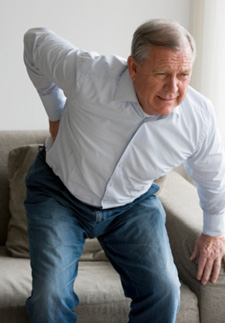
Studies show that sitting increases the signs of aging
We spend half our lives sitting down and studies now show that it increases our risk of dying from all diseases. The British Journal of Sports Medicine has published research that shows that reducing sitting time, that is being more active, increases the length of the protective caps on the ends of our DNA known as ‘telomeres’. Telomeres, which are proteins, sit on the end of chromosomes and prevent damage during cell division.
If they perform well (are longer), the cells produced during cell division are healthier and live longer. The shorter the telomeres the more likely they are to being linked to diseases related to ageing such as heart disease, many cancers, diabetes, obesity and strokes. Researchers believe that standing and being active develops longer telomeres – the mechanism by which standing delivers a longer, healthier life.
Chiropractors have worked for years to encourage more active lifestyles and have tried to reduce the amount of time that we sit. The body works best when the immune system is constantly stimulated. When nerves are irritated and the control of the nervous system is compromised there are chemical, cellular and neurological effects on the performance of the body.
Even GP’s are beginning to stand at work. Dr Mohammed Rashid (Cambridge University), in an article in the British Medical Journal argued that GPs are risking their health by sitting all day and suggested that more consultations should be done with doctors and patients standing.
This latest study is particularly interesting because it showed that exercising around a sedentary lifestyle did not lengthen telomeres and therefore did not make up for the ill-effects of being sedentary for the rest of the day. This supports previous studies that found that sitting for several hours was the factor that produced these ill effects.
Another study this year looked at 92,000 women over a 12 year period and found that those who spent most time sitting, 11 hours or more per day, had a 12% increase in dying from any condition compared to those who did not sit as much. Specific to diseases they had a 27% increased risk of dying from heart disease and a 21% rise in dying from cancer.
Sitting for long periods means you don’t contract your large skeletal muscles and this may impact on the body’s metabolism. This results in higher levels of unhealthier types of fat (triglycerides) whilst decreasing the high-density lipoproteins (good cholesterol). In addition many of our organs work best when massaged by movement. Proper, good and regular movements are good for joints and bone structures and this is evident when clients attend for regular chiropractic care.
Those with good mobility and flexibility have fewer problems mechanically and with health in general.
Shorter sitting times, regular short walks and watching less television may all reduce the risk of heart disease and diabetes. In studies, television time is often used as a proxy for sitting. One study was brutal in how it put the facts: an adult who watches an average of six hours of television a day over his or her lifetime can expect to live 4.8 years less than someone who does not watch television.
